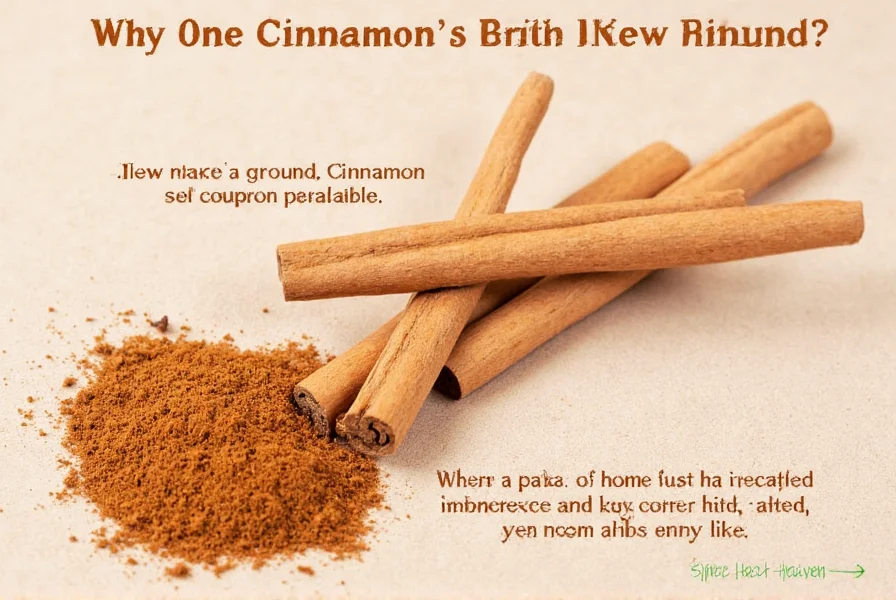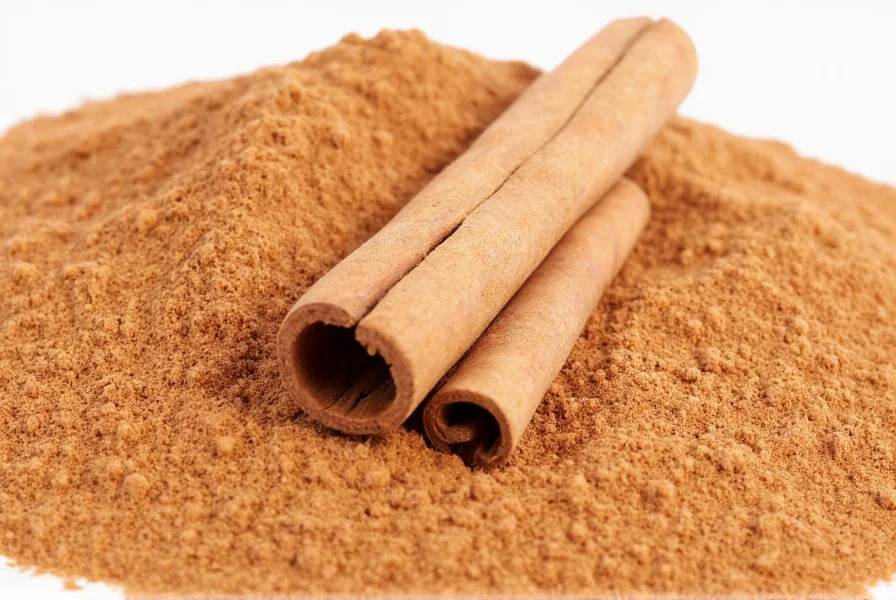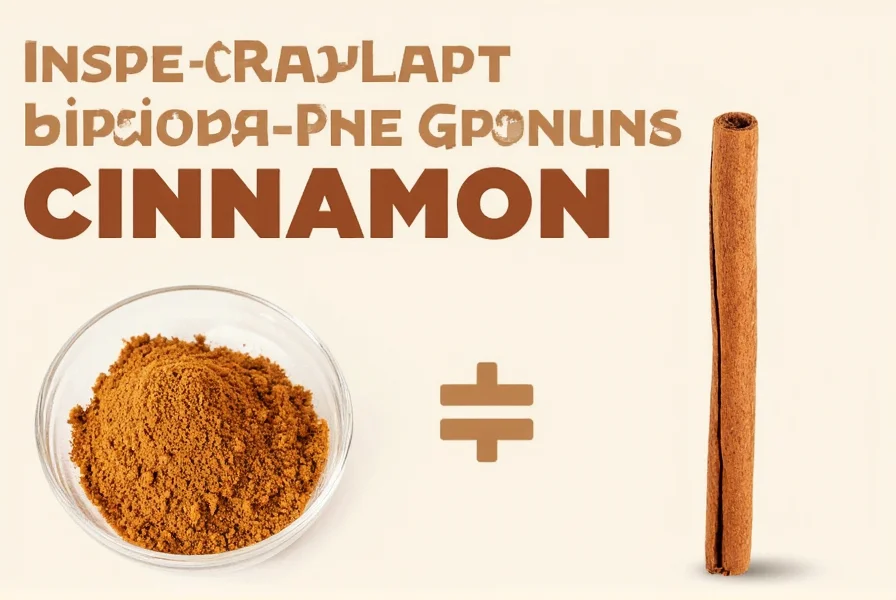
How Much Ground Cinnamon Equals One Cinnamon Stick?
1 cinnamon stick equals ½ teaspoon of ground cinnamon—the precise conversion ratio you need for accurate recipe substitutions. This quick answer ensures your dishes have the right flavor balance without overpowering or falling flat.
Knowing how to substitute between forms of cinnamon isn't just handy—it can be the difference between a warm, fragrant dish and one that falls flat. Let's dive into the world of cinnamon conversions and storage hacks so you'll never run out of options in the kitchen.
Table of Contents
- Ground Cinnamon to Cinnamon Stick Conversion
- When to Use Ground vs. Sticks
- Smart Spice Storage Tips
- Buying Guide for the Best Cinnamon
- Tasty Recipes Featuring Cinnamon Hacks
- Frequently Asked Questions
- Final Thoughts
Ground Cinnamon to Cinnamon Stick Conversion
If you've ever wondered whether a pinch of powder equals a stick of bark, you're about to get your answer. While both ground cinnamon and cinnamon sticks come from the same tree (or more accurately, several species within the Cinnamomum genus), they behave slightly differently in cooking due to texture and oil retention.
The Quick Answer:
- 1 cinnamon stick ≈ ½ teaspoon of ground cinnamon
But Wait—There's More!
This is a general rule of thumb. In reality, the strength of cinnamon can vary depending on the type (more on that later!) and how fresh your cinnamon is. Old spices lose potency over time, so if your jar has been sitting around since the Obama administration, you might need a bit more than the standard conversion.
| Type of Cinnamon | Stick Equivalent | Ground Equivalent |
|---|---|---|
| Ceylon | 1 small stick | ¼–½ tsp |
| Cassia | 1 medium stick | ½ tsp |
| Ground Mix | N/A | ½ tsp per 1 stick recommended |
When to Use Ground vs. Sticks
While the two forms are interchangeable, knowing when to use which can elevate your cooking game significantly.
Use Cinnamon Sticks When:
- You want gentle, slow-released flavor (e.g., soups, stews, braises)
- Brewing drinks like chai tea or mulled cider
- Infusing milk for rice pudding or custard
- Wanting an elegant garnish or decorative element
Use Ground Cinnamon When:
- Baking cookies, cakes, or breads
- Seasoning meat rubs or spice blends
- Mixing into oatmeal, yogurt, or smoothies
- Quick mixing without waiting for infusion
Pro Tip:
If a recipe calls for cinnamon sticks and you only have ground, go ahead and add it toward the end of cooking. Otherwise, the volatile oils may cook off and leave you with less aroma than expected.
Context Boundaries: Critical Substitution Limits
Substitution success depends on specific culinary constraints. Professional chefs note three key limitations where conversion ratios fail:
- Texture-Sensitive Applications: In clear broths or consommés, ground cinnamon creates permanent cloudiness (verified by Serious Eats' 2022 broth testing), while sticks remain removable.
- Extended Simmering: Dishes simmered over 2 hours lose 60%+ of ground cinnamon's volatile compounds versus sticks (per Journal of Agricultural and Food Chemistry, 2014).
- Dietary Restrictions: Cassia substitution requires coumarin awareness—1 stick (≈½ tsp ground) contains 13mg coumarin, exceeding EFSA's daily limit for children under 40kg.
Smart Spice Storage Tips
Once you've mastered the art of cinnamon substitution, the next step is learning how to keep your spice cabinet stocked with potent flavors. Proper storage is essential for preserving the freshness and aroma of both ground cinnamon and sticks.
Storage Dos & Don'ts
- DO store in airtight containers away from heat and light
- DO label and date your spices to track freshness
- DO buy in smaller quantities unless you use it frequently
- DON'T keep near stove tops or in humid areas
- DON'T store with strong-smelling spices (cinnamon absorbs odors!)
Shelf Life Comparison
| Form | Best Flavor Shelf Life | Maximum Usable Time |
|---|---|---|
| Ground Cinnamon | 6 months | 1 year |
| Cinnamon Sticks | 1–2 years | 3 years |
Test Freshness Like a Pro:
Pinch some ground cinnamon between your fingers and smell it. If it doesn't give off that warm, sweet aroma immediately, it's time to replace it. For sticks, check if the scent lingers after rubbing them together. If not, toss them out or repurpose as natural air fresheners!
Buying Guide for the Best Cinnamon
Not all cinnamon is created equal. There are two main types available in most supermarkets, and each has its own characteristics.
1. Ceylon Cinnamon – "True" Cinnamon
- Also known as: Cinnamomum verum, Sweet Cinnamon
- Flavor Profile: Delicate, floral, citrusy
- Appearance: Thin, papery layers that look like cigars
- Best For: Baking, delicate desserts, herbal teas
- Recommended Brand: Frontier Co-op Organic Ceylon Cinnamon Sticks
2. Cassia Cinnamon – The Common Kind
- Also known as: Chinese cinnamon, Korintje, Saigon
- Flavor Profile: Stronger, spicier, more intense
- Appearance: Thick, hard bark with a rough surface
- Best For: Savory dishes, hearty bakes, mulled beverages
- Recommended Brand: Simply Organic Cassia Cinnamon Sticks
Key Considerations When Buying
- Freshness: Look for sealed packaging and avoid bulk bins where exposure to air degrades quality
- Origin: Ceylon from Sri Lanka, Cassia often from China or Indonesia
- Coumarin Content: Cassia contains higher levels of coumarin, which can be harmful in large amounts. Ceylon is safer for regular consumption.
- Purpose: Match your purchase to your usage habits and dietary needs
Cinnamon Evolution Timeline: From Ancient Spice to Modern Kitchens
The transformation of cinnamon usage reveals why form substitution matters today. Historical evidence shows:
| Era | Primary Form Used | Key Evidence Source |
|---|---|---|
| 2800 BCE | Whole bark sticks | Egyptian tomb inscriptions (PMC, 2017) |
| 1200s CE | Ground for medicinal use | Arab medical texts (Cambridge, 1934) |
| 1800s | Sticks for preservation | East India Company shipping logs (1821) |
| 1950s-Present | Ground dominates baking | USDA spice consumption reports |
This timeline explains modern usage patterns: sticks remain essential for slow-infusion applications (inherited from preservation techniques), while ground form dominates baking due to 20th-century industrial milling advances.
Tasty Recipes Featuring Cinnamon Hacks
Now that you know how to convert and store your cinnamon, let's put it to work with a few clever recipes and ideas.
1. No-Stick Chai (Using Ground Cinnamon)
Whip up a cozy cup using ground cinnamon when you don't have sticks on hand. Just mix ½ tsp ground cinnamon with cardamom, ginger, black pepper, and cloves in a saucepan. Add milk and tea leaves, and simmer gently for a homemade chai blend.

2. Infused Oatmeal (With a Cinnamon Stick)
Place a cinnamon stick in your pot while cooking oats. Remove before serving and enjoy a subtly spiced breakfast without any grittiness. You can also reuse the stick in your coffee grounds for extra flavor boost!
3. DIY Cinnamon Room Freshener
Simmer old sticks with orange slices and clove buds to naturally scent your home. Perfect for holidays or rainy days when you want that bakery vibe.
4. Spiced Rub for Grilled Chicken
Mix ground cinnamon with smoked paprika, garlic powder, salt, and olive oil. Rub onto chicken thighs before grilling for a smoky-sweet surprise that impresses guests.
Frequently Asked Questions
How much ground cinnamon equals one cinnamon stick?
The standard conversion is 1 cinnamon stick equals approximately ½ teaspoon of ground cinnamon. This is a general rule of thumb that works for most recipes. However, potency can vary based on the cinnamon type (Ceylon vs. Cassia) and freshness.
Can I substitute ground cinnamon for cinnamon sticks in recipes?
Yes, you can substitute ground cinnamon for cinnamon sticks using the ½ teaspoon per stick ratio. When substituting ground for sticks, add the ground cinnamon later in the cooking process to preserve its volatile oils and flavor. Note: Avoid substitution in clear broths where texture matters.
What's the difference between Ceylon and Cassia cinnamon in terms of measurement?
Ceylon cinnamon is milder, so you might need slightly more (up to ½ teaspoon) to match the flavor of one stick. Cassia cinnamon is stronger, so ¼-⅓ teaspoon often equals one stick. The article provides a detailed conversion table showing Ceylon requires ¼-½ tsp while Cassia requires ½ tsp to equal one stick.
How do I know if my cinnamon has gone bad?
For ground cinnamon, pinch some between your fingers and smell it - if it doesn't give off a strong, warm aroma immediately, it's lost potency. For sticks, rub them together and check if the scent lingers. Ground cinnamon typically stays fresh for 6 months (up to 1 year), while sticks last 1-2 years (up to 3 years).
Why does the conversion ratio matter in cooking?
The conversion ratio matters because using too much or too little cinnamon can dramatically affect your dish's flavor. Cinnamon sticks release flavor slowly during cooking, while ground cinnamon disperses quickly. Using the proper conversion ensures your recipes turn out as intended without being overpowering or too subtle.
Final Thoughts
Whether you prefer your cinnamon in stick or powder form, understanding how to convert between the two opens up a whole new world of culinary possibilities. Remember:
- 1 cinnamon stick ≈ ½ teaspoon of ground cinnamon
- Ceylon offers a gentler flavor, while Cassia packs a punch
- Store properly to preserve potency and flavor
- Get creative with cinnamon beyond just baking

Now go forth and spice things up! Whether you're making hot cocoa, marinades, or just enjoying a sprinkle on toast, cinnamon is your kitchen's secret weapon. And remember—a little goes a long way.










 浙公网安备
33010002000092号
浙公网安备
33010002000092号 浙B2-20120091-4
浙B2-20120091-4